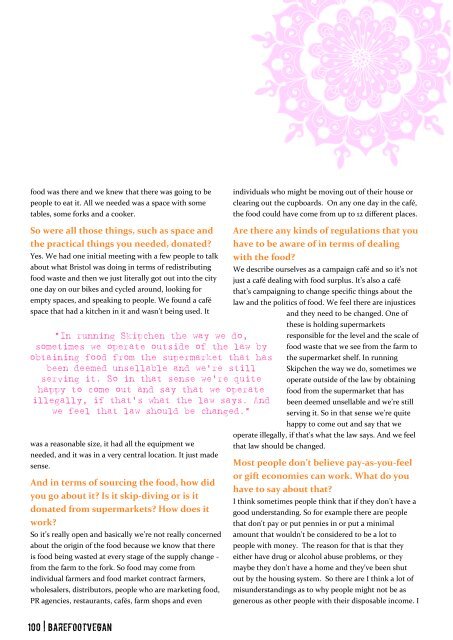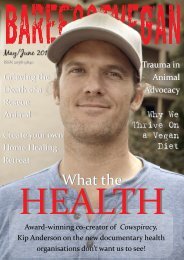barefoot vegan sept_oct issue.pdf
- No tags were found...
Create successful ePaper yourself
Turn your PDF publications into a flip-book with our unique Google optimized e-Paper software.
food was there and we knew that there was going to be<br />
people to eat it. All we needed was a space with some<br />
tables, some forks and a cooker.<br />
individuals who might be moving out of their house or<br />
clearing out the cupboards. On any one day in the café,<br />
the food could have come from up to 12 different places.<br />
So were all those things, such as space and<br />
the practical things you needed, donated?<br />
Yes. We had one initial meeting with a few people to talk<br />
about what Bristol was doing in terms of redistributing<br />
food waste and then we just literally got out into the city<br />
one day on our bikes and cycled around, looking for<br />
empty spaces, and speaking to people. We found a café<br />
space that had a kitchen in it and wasn’t being used. It<br />
was a reasonable size, it had all the equipment we<br />
needed, and it was in a very central location. It just made<br />
sense.<br />
And in terms of sourcing the food, how did<br />
you go about it? Is it skip-diving or is it<br />
donated from supermarkets? How does it<br />
work?<br />
So it’s really open and basically we’re not really concerned<br />
about the origin of the food because we know that there<br />
is food being wasted at every stage of the supply change -<br />
from the farm to the fork. So food may come from<br />
individual farmers and food market contract farmers,<br />
wholesalers, distributors, people who are marketing food,<br />
PR agencies, restaurants, cafés, farm shops and even<br />
Are there any kinds of regulations that you<br />
have to be aware of in terms of dealing<br />
with the food?<br />
“In running Skipchen the way we do,<br />
sometimes we operate outside of the law by<br />
obtaining food from the supermarket that has<br />
been deemed unsellable and we’re still<br />
serving it. So in that sense we're quite<br />
happy to come out and say that we operate<br />
illegally, if that's what the law says. And<br />
we feel that law should be changed.”<br />
We describe ourselves as a campaign café and so it’s not<br />
just a café dealing with food surplus. It’s also a café<br />
that’s campaigning to change specific things about the<br />
law and the politics of food. We feel there are injustices<br />
and they need to be changed. One of<br />
these is holding supermarkets<br />
responsible for the level and the scale of<br />
food waste that we see from the farm to<br />
the supermarket shelf. In running<br />
Skipchen the way we do, sometimes we<br />
operate outside of the law by obtaining<br />
food from the supermarket that has<br />
been deemed unsellable and we’re still<br />
serving it. So in that sense we're quite<br />
happy to come out and say that we<br />
operate illegally, if that's what the law says. And we feel<br />
that law should be changed.<br />
Most people don’t believe pay-as-you-feel<br />
or gift economies can work. What do you<br />
have to say about that?<br />
I think sometimes people think that if they don’t have a<br />
good understanding. So for example there are people<br />
that don't pay or put pennies in or put a minimal<br />
amount that wouldn't be considered to be a lot to<br />
people with money. The reason for that is that they<br />
either have drug or alcohol abuse problems, or they<br />
maybe they don't have a home and they've been shut<br />
out by the housing system. So there are I think a lot of<br />
misunderstandings as to why people might not be as<br />
generous as other people with their disposable income. I<br />
100 | BarefootVegan





